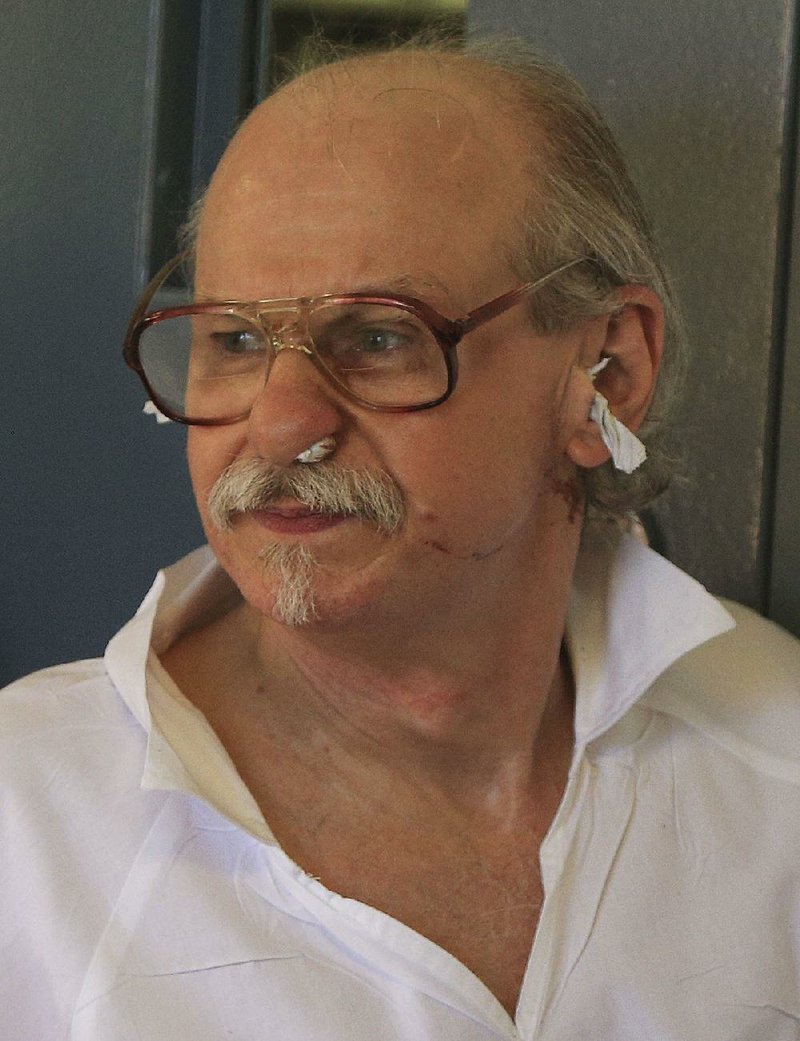A week before Arkansas is due to execute condemned murderer Jack Greene at the Cummins prison, a pair of death penalty-related lawsuits continued their progression through state courts Thursday.
In a ruling in one case, the Arkansas Supreme Court said the state cannot keep secret certain documents used to identify the makers of its supply of lethal injection drugs. However, the high court said it would allow for some details to be redacted, so that the middlemen sellers of the drugs remain veiled.
Earlier in the day, Greene appeared in shackles at the Jefferson County Courthouse on Pine Bluff's Main Street, where, in the other case, his attorneys contested state prisons Director Wendy Kelley's determination that Greene is mentally competent to be executed.
Greene, who was sentenced to die for the 1991 murder of retired Johnson County minister Sidney Burnett, has delusions so severe that he cannot comprehend the reason for his execution, his attorneys contend.
[DEATH PENALTY: Interactive tracks all executions in U.S. since 1976]
In Jefferson County, they sought a judge's order for an independent mental health evaluation. The 11th West Judicial Circuit judge, Jodi Dennis, didn't rule on the matter by the close of business Thursday.
During the roughly 20-minute hearing, Greene hunched his body over the bar -- the contortions alluded to in court filings describing his delusions of pain. At the end of the hearing, he spoke up to accuse his attorneys of being involved in a state conspiracy against him, before Dennis silenced him.
Greene's execution is scheduled for Thursday. He has one open case directly involving his sentence, the pending appeal in Jefferson County.
However, the other lawsuit -- over a Little Rock attorney's public records request for materials related to a recently acquired sedative -- also could have implications in the scheduled execution.
During Arkansas' attempt at carrying out eight executions in April, two pharmaceutical companies intervened in ongoing lawsuits over those inmates. The companies declared they had manufactured the drugs the state planned to use and alleged that prison officials had skirted safeguards by the companies intended to prevent the drugs from falling in the hands of executioners.
The companies' legal pleas were ultimately unsuccessful in halting execution plans. However, four of the condemned prisoners had their punishments stayed by the courts in other litigation. Four inmates were executed.
The maker of the sedative midazolam used in April's executions, New Jersey-based West Ward Pharmaceuticals USA, was one of the manufacturers to sue the state. Arkansas purchased a new supply of the drug in August, and the manufacturer of that supply remains unknown.
After the Department of Correction announced it had obtained more midazolam, and Gov. Asa Hutchinson scheduled Greene's execution for Nov. 9, attorney Steven Shults filed a public records request for package inserts and drug labels which could be linked to a manufacturer of the midazolam. When the prisons department denied his request, Shults sued for the information.
"Manufacturers pretty much oppose the use of their drugs in executions," said Heather Zachary Goodson, Shults' lawyer, while emphasizing that her client's primary aim in suing the state is to increase public transparency.
"Mr. Shults' interest in this case is not directly related to the execution of Mr. Greene," Goodson said.
State attorneys have argued to keep secret the origins of Arkansas' execution drug supply, pointing to the state's 2015 method of execution law that exempts the release of information that can identify those who "compound, test, sell or supply" the lethal concoction. While prison officials in the past released drug labels and package inserts, they stopped after a reporter was able to link those materials to a specific manufacturer.
After a Pulaski County circuit judge ordered the state to release the materials in their entirety in September, the state appealed to the high court. However, Justice Courtney Goodson, who authored the majority opinion, wrote that the law does not explicitly name manufacturers among its exemptions. (Justice Goodson is not related to Heather Goodson, Shults' attorney. However, Heather Goodson once clerked for the justice, who declined to recuse from the case.)
Because the law requires the state prisons department to use FDA-approved drug manufacturers, Justice Goodson wrote that it is in the public's interest to be able to verify if the state is complying with its own laws.
As for other suppliers in the "chain of distribution," Justice Goodson said the documents Shults sought could be redacted to keep secret the middlemen, including the source that sold 40 vials of midazolam to the state in August.
The Supreme Court did not order the prisons department to immediately release the documents Thursday. Instead, the justices remanded the case back to the lower court, with orders for a judge to determine which part of the materials to redact.
A spokesman for Attorney General Leslie Rutledge, who was representing the prisons department, said Rutledge was evaluating her options late Thursday.
The purpose of the secrecy provisions in the law, according to the lawmaker who wrote it, was to help the state maintain a ready supply of lethal drugs to be used in executions.
"All of these folks were reluctant to sell to the Arkansas Department of Correction, or any other state's department of corrections for that matter, unless they had anonymity," said state Rep. Doug House, R-North Little Rock, the lead sponsor of the Method of Execution Act.
"We thought we had all the bases covered," House said.
Justice Goodson's majority opinion was supported by two opinions that concurred in part, while dissenting in other parts. Justices Shawn Womack and Rhonda Wood said they would have protected manufacturers and not ordered the release of any materials. Chief Justice Dan Kemp, along with Justice Robin Wynne, said they would have affirmed the circuit court's ruling to release unredacted copies of the materials.
As it stands, the majority said it will issue its mandate to the lower court within three days, unless there is a petition for rehearing.
A Section on 11/03/2017
